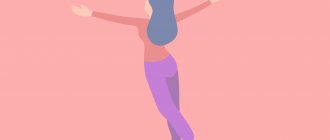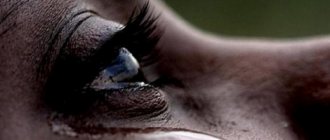Fear of pain. This is why many people sometimes don’t take action, don’t make decisions, don’t start relationships, or can’t express themselves. It will hurt. Even going to the doctor is sometimes scary - it will hurt.
Can we, if not avoid pain, then at least minimize it? And if so, how? In this article we will talk about physical pain and the emotional fears that are associated with it.
Navigation through the article “Fear of pain: physical pain. What are we really afraid of?
- Physical pain
- Are pain caused by emotions, or is pain caused by emotions?
- Psychogenic pain in the body
- Fear of pain - what are you really afraid of?
- The pain won't stop
- Fear of death
- I will not be able to continue living a full life
- Humiliation
- Losing control
Physical pain
If we abstract a little from the versatility of our consciousness, and now consider only the physiological principles of the functioning of our body and brain, we will get the following. What does pain mean ? This is a signal that one of our senses sends to the central coordinator - the brain.
In physiology this is called nociception. Nociceptors are pain receptors that recognize harmful, damaging effects on tissues and organs of the body. Impacts can be mechanical, thermal or chemical.
Nociceptors transmit a signal about damage first to the spinal cord and then to the brain. As a result, a person learns already at the level of consciousness that he is in pain. And all this is needed so that a person can take some action to resolve the situation.
Physical pain itself has some natural regulation. For example, under very strong stress on the body, when the pain becomes too acute, a person often loses consciousness.
This mechanism is provided by nature so that a person can “rest” at least for a little time from experiences and gather strength to fight a traumatic situation or a disease of some organ.
At the same time, the human body has many of its own internal ways of coping with pain, depending on the situation. Internal opiates - endorphins - are designed to reduce it and have a relaxing effect on the muscles.
Adrenaline is also used to reduce pain, but on the contrary, to stimulate a person’s activity as much as possible and help him, for example, effectively get out of a dangerous situation.
The body itself can often tell you (if you listen to it carefully) what posture or what action can lead to a reduction in pain.
But there is another factor that is decisive for a person - emotions. That which arises in the process of the appearance of pain and is fully involved not only in the perception of impulses transmitted by pain receptors, but also in the formation of further chemistry of pain.
Surely each of you has observed that a surge of adrenaline, which is always easy to recognize by an increased heart rate, a sudden surge of strength, a feeling of anxiety and determination at the same time, a decrease in body sensations, a narrowing of consciousness, happened to you not only when the danger was real, but also when when there was no danger, but only a thought that worried you.
If a mental idea, a fantasy, can cause such a strong chemical reaction, then it turns out that emotions have a very large, if not decisive, role in the formation of what is commonly called “physical pain.”
Hot topic
Trypanophobia is a common psychological disorder.
This is a pathological fear of pricks, needles, syringes and injections. According to a study published in 2012 by the medical journal Vaccine by scientists at the University of Toronto (Canada), two-thirds of children and a quarter of adults are fearful and tense about needles. From 5 to 10% of the world's population experiences severe fear and anxiety at the thought of a medical syringe. Urgency
Photo: IZVESTIA/Pavel Bednyakov
In an unhealthy body: the top 5 consequences of COVID-19 are named
The only way to avoid complications is vaccination
There is an opinion that trypanophobia directly depends on the historical factor in the provision of medical services. In countries where disposable syringes with thin needles appeared earlier (in particular, in the USA), there is less fear of injections than in countries where thick metal needles of reusable syringes have been used for a long time (for example, in Russia and post-Soviet states).
Those suffering from this phobia usually honestly admit that they are afraid of injections. However, talking about a sensitive topic is disgusting and unpleasant for them. Just the thought of the procedure makes you wince and causes a lot of suffering. Moreover, the closer the moment of vaccination, the more difficult it is to remain calm.
Are pain caused by emotions, or is pain caused by emotions?
At the emotional level, we first of all evaluate our state. We put a label on it, and these labels look like this - “bad”, “something happened”, “this could end in death”, “I can’t stand it”, “all plans collapsed”, etc.
Emotions, of course, influence the course of the pain process and, most often, in the direction of intensification. Let's say you have a stomach ache. Well, I got sick - maybe it’s not scary at all. You ate something stale, the body recognized it as a chemical invasion, the corresponding receptors turned on and sent a signal to the brain.
Perhaps all you have to do is drink more/eat something else/go to the toilet/just lie down and relax - and most likely everything will pass. What does pain mean? – the body is fighting a chemical invasion, which it notified you about.
It may not take much time for your body to overcome the situation. As a last resort, you can take a pain reliever to reduce smooth muscle spasm.
In most cases, your pain has every chance of not developing into anything serious. But many often begin to “increase” the pain: get scared of it, draw pictures like “what if it’s appendicitis and I’ll die from peritonitis?”, “what if I have a dangerous infection?”, in the easiest case – “I won’t get caught.” for an appointed meeting, this will ruin all my plans, oh, what an unbearable pity,” etc.
What happens to the body – I think it’s clear. The fear of pain or unpleasant events in connection with it triggers a new surge of adrenaline, the spasm becomes stronger, the heartbeat becomes faster, the horror becomes even deeper, the adrenaline becomes even more, and so on in a circle. As a result, either you will be able to stop all this pandemonium with an effort of will, or you will faint.
I described all these mechanisms in an article about a panic attack, if you want to understand them in more detail with examples, read it. Here it is important for us to pay attention to something else - physical pain can develop into mental pain and vice versa, and with your direct participation.
You can, for example, upon learning unpleasant news or hearing hurtful words, go deeper into “chewing” the offense and ultimately create a chemical cocktail in your body that will lead not only to real tachycardia, but even to a heart attack, if there is any associated it is a physiological disposition.
In other words, when we begin to “increase” emotions, we generate approximately the same set of chemical changes, but they can affect different systems of the body. Most often, the weakest genetically or simply overloaded systems of your body are the first to suffer.
Psychogenic pain in the body
It happens like this - there is a symptom, but there is no organic cause, and even a functional disorder is not visible. Simply put, your leg hurts, but the joints, bones, and muscle tissue are in perfect order, both statically and dynamically.
Or the same notorious stomach - you cringe almost every time after eating (or before eating - everyone has their own picture), but gastroenterologists do not find any abnormalities. And it hurts so much that it could even make a wolf howl. What are the causes of pain ?
Most often, psychogenic pain is based on muscle tension. In the case of the same abdomen, there may well be some kind of pinched muscle, which can be located either close or at a great distance from the point of pain.
Given that nerve fibers are connected almost throughout the body, we are not always able to immediately calculate where the source may be. Most often, this can only be determined experimentally.
But in most cases, the muscles are also tightened for a reason. Please note: when you expect a blow or other trouble, your shoulders seem to rise of their own accord. These are reflex actions of the body designed to protect you from a blow if it is real.
The body doesn’t know whether they are really going to beat you, or have you just imagined a picture of humiliation, and so far only verbal? The body understands everything literally: if there is fear, you need to defend yourself. And as a result, strain the corresponding muscles.
In most cases, a modern person believes that his emotions, in general, have little effect on anything. I was afraid and stopped, it seems. But the clamp in the body remained. Because no one gave the body the command to relax. And even more so if you experience fear chronically. Then it simply does not have time to relax at all.
The clamps become habitual, the muscles are unevenly tense/relaxed, the body warps, the correct configuration of the spine is disrupted, and internal organs are displaced.
Then, naturally, when the displacement occurs, the blood supply and functioning of the organ are disrupted. And you can expect quite material and medically diagnosed diseases. The direct causes of pain in this case are your emotions.
In general, as I already wrote, it happens both like this and vice versa. It is not always possible to say which comes first - the chicken or the egg. But if we cannot control all the physical processes in the body, then we can completely control our emotions. To do this, you just need to understand them.
Signs of algophobia
The main sign of pathology is an insurmountable fear of experiencing another pain. Suddenly anxiety appears, anxiety increases with the manifestation of panic.
Signs of algophobia manifest themselves as follows:
- Increased heart rate, tachycardia, increased blood pressure.
- Shortness of breath, feeling of lack of air.
- Trembling in the body, weakness in the limbs.
- Pallor of the skin.
- Increased level of sweating.
- Dizziness.
- Attacks of nausea, vomiting.
- Cramps in the abdominal area.
- Panic fear.
- Loss of consciousness.
Fear of pain - what are you really afraid of?
When I asked my clients about what exactly they were afraid of (fear of childbirth, fear of surgical interventions, girls’ fear of first sex precisely because of pain, fear of fighting, etc.), I often heard: “it will hurt “I can’t stand it.”
How can I not bear it? What will happen? Ask yourself this question. After all, in fact, “I can’t stand it” from a physiological point of view will mean “I will lose consciousness.” And what's so scary about that? On the contrary, the pain will disappear. So what are you afraid of?
The options are usually:
- The pain won't stop
- I will die
- I will not be able to continue living a full life
- Humiliation - I will be seen as weak, and I will feel insignificant
- I'll lose control of the situation
The point, as you see, is not the fact of pain itself. Whatever the physical pain - acute, chronic, periodic - all processes in the body are finite. Acute pain makes it clear quite quickly what happened in the body and where, and to take appropriate measures, even if this requires outside help.
Chronic pain is rarely acute; the brain is able to think and make decisions even in the presence of pain. And sooner or later you will hear your body and be able to help it. But, as a rule, fear of pain implies other experiences listed above.
Let's try to deal with them first.
The pain won't stop
This is unlikely. If the pain is very acute, on the verge of perception, then consciousness will turn off. If the pain is relatively tolerable and allows you to remain conscious, you will find a way to call for help or help yourself.
The fear of pain , which supposedly will last forever, is based on the fact that you perceive your body as something alien and hostile, something that you cannot control. But the body is yours, and if you are conscious, you are able to take certain measures to eliminate pain. And if you are unconscious, then pain does not exist for you.
Fear of ongoing pain is fear of helplessness: you don’t believe in yourself, your ability to help yourself, or anyone else’s. And this is based on a strong distrust of both the world and one’s own strengths.
Think: why do you distrust the world and yourself so much? Perhaps it makes sense, without waiting for pain, to begin now to change your attitudes regarding your own strengths and the world that surrounds you?
Do you consider yourself weak? Not smart enough? Do you think that the world around you consists exclusively of indifferent people? Or do you think that the world works like this in general - it exists solely to make you suffer? Who and when “helped” you form such a picture of the world?
Trusting the world and yourself is a voluminous topic that will be the subject of a separate article, but for now you just have to think about it: where do you get such a picture of the world and yourself from in your head? Perhaps not all of your beliefs about yourself are true? And many could be reconsidered?
Fear of death
The thing is really serious, but, in essence, what can we do about the fact that sooner or later we will die? Fear of death activates the instinct of self-preservation, which allows you to act effectively in situations of pain and threat to life.
But often, when you don't do something for your body because of the fear of pain, which is dictated by the fear of death, you expose yourself to an even greater danger of death. For example, if you refuse an important surgical procedure that could cause you pain but save you from a serious illness, you thereby increase the risk of death.
And to generalize even more broadly, are you ready to give up the development of your own life because there is potentially a threat of death? This does not mean constantly risking yourself (although you probably know that there are people who constantly risk themselves, however, most of them live to old age and die not at all because of these risks).
Many human actions that lead to development are inherently risky. Traveling, childbirth, mastering a vehicle, medical research and interventions - all this, of course, should not be done recklessly and haphazardly.
But can you reduce your existence to locking yourself within four walls, not letting anyone near you and not trying to learn anything new? The result will be the same - we will die.
>
And if the fear of death blocks actions that could diversify your life, develop your personality, give life to another person, or enter into a relationship, then it makes sense to think about long-term psychotherapy.
Working with the fear of death includes issues of restructuring the picture of the world, and issues of trusting the world and oneself, and building contact with the body, and issues of regulating emotions. Here I can only point out the general essence of the problem that is worth thinking about.
I will not be able to continue living a full life
Alas, no one promised us that our lives would be fulfilling 100% of the time. And what is considered complete? Only those moments where we are happy and satisfied?
Not only great writers and philosophers have created utopias; almost everyone has a utopia in their heads. Utopia is a world where there is no suffering, no negative emotions, no wasted time, no mistakes and no problems.
But such a life does not exist. And at that moment when something hurts you - yes, you are not able to live the way you lived, for example, before - enjoying life. However, our body and nervous system are designed in such a way that excitation is always replaced by inhibition; when we tense a muscle, sooner or later we feel the need to relax it, wakefulness inevitably gives way to sleep, etc.
Can we claim to correct this mechanism? No. Joy is replaced by pain, pain by joy, fear by relaxation and peace, peace by new fear. Yes, the overall amount of pain can be reduced, and we will talk about this in detail in a separate article about techniques and techniques for working with pain.
But it is impossible to turn off this mechanism altogether. And yes, at the moment of pain you will not be able to continue a “full life”. You will find out the causes of pain and deal only with pain - and this, apparently, is the most important thing that should happen to you at the moment.
Pain is an important part of you, it is also a part of your life. Accepting this is already 50% of the pain. Stop demanding from yourself to “always be in shape”, constantly enjoy life, always follow plans, always be “combat ready” - this is an unrealistic requirement.
And, having accepted this, you will be able to spend your energy on effectively working with pain, and not on regrets that it happened at all and not on fears that will only increase it.
Humiliation
Who and when told you that a person experiencing pain is inferior? How do you feel about someone who is in pain? If you also feel contempt for him, most likely you are a hostage to inflated demands, both on yourself and on the world. And even if you make this demand only for yourself, perfectionism is not a very productive state.
Demanding perfection from yourself will not make the pain any less. Vice versa. There will be more of it. Because you are in constant tension and anxiety. And this will tighten your muscles more and lead to new rounds of pain.
You've probably met people who literally hurt everything, although outwardly they seem healthy. Or maybe you recognize yourself in this? Now the stomach, then the head, then the back, then the legs, then something pricks under the rib or radiates into the shoulder blade….
As a rule, at a relatively young age, doctors “find nothing” in such people. What does pain mean ? – unknown. But at an older age, all this leads to the above-described disruption of the general balance of the body and diseases of specific organs.
The second point associated with feeling humiliated when in pain is that you do not accept your body as it is. And it is like this - with pain, urination, defecation, sometimes acne and inevitably wrinkles, snot and sweating.
All these are metabolic and regulatory mechanisms that allow us to survive. By denying and rejecting them, you begin to fight with yourself. But no person can defeat his body. Extending life - yes, we are able to do that. Living it well is the same.
But this is only possible through accepting your own body and working with it. And not through war. War with your own body will simply kill you much faster than the natural mechanism of aging.
Denial of natural bodily mechanisms is often a consequence of upbringing - parents are often tired of the natural manifestations of the child’s body, who is still learning to use it, and complaints begin in the spirit of “why couldn’t you go to the toilet before?”, or “come on faster, why should I?” Did she put you on the potty?”, “you have snot again”, “don’t touch your pussy”, etc.
This is how the child gets used to the idea that the body interferes with living normally and receiving sufficient parental approval. And then society also gets involved with its claims and standards of what a “successful” person should supposedly look like.
Yes, the smell of sweat, for example, is unpleasant, but it can be eliminated with timely washing and reasonable use of perfume. But tightly blocking the sweat glands with special antiperspirants creates a threat of inflammation.
Sweat never stops forming. And antiperspirant prevents it from coming out. Sweat contains toxins that sooner or later begin to decompose right under the skin without finding a way out. And city dwellers have already accumulated many such examples of unhealthy blocking of the natural functions of the body.
I am by no means calling for neglecting hygiene and social boundaries. The only question is how to take care of your body. Often the “care” of a modern person is an attempt to eliminate natural bodily manifestations and block them, and not simply to eliminate the consequences or take preventive measures.
And in order to listen to the body and care for it exactly as your body needs, it makes sense to respect it. Along with all natural functions.
The third point associated with the feeling of humiliation when experiencing physical pain concerns the manifestation of emotions. Many people, especially men, are raised in our culture to be ashamed of their emotions.
Showed emotion - “weakling”. How does this whole mechanism work? Exclusively from within you. After all, if you yourself do not believe that the manifestation of emotions characterizes you as weak and insignificant, you are unlikely to react to other people’s reproaches.
Find a quality in yourself that you are confident in. Suppose it is the mind. If a stranger starts telling you that you are a fool, you are unlikely to take his words seriously. Even if there are several such people, you know that you are smart.
It’s the same with feelings - if you are confident within yourself that you have the right to your feelings, the reproach will either not be significant for you, or will not happen at all. After all, we often, through unconscious mechanisms, attract to ourselves what we expect. And if we don’t expect it, then most often it doesn’t happen.
It’s natural to show feelings when you’re in pain, and you have every right to do so. All that remains is to work on accepting your own feelings and developing the skill of living not in your own or someone else’s past experience, not “in your head” and its fantasies, but in the present, in the here and now.










